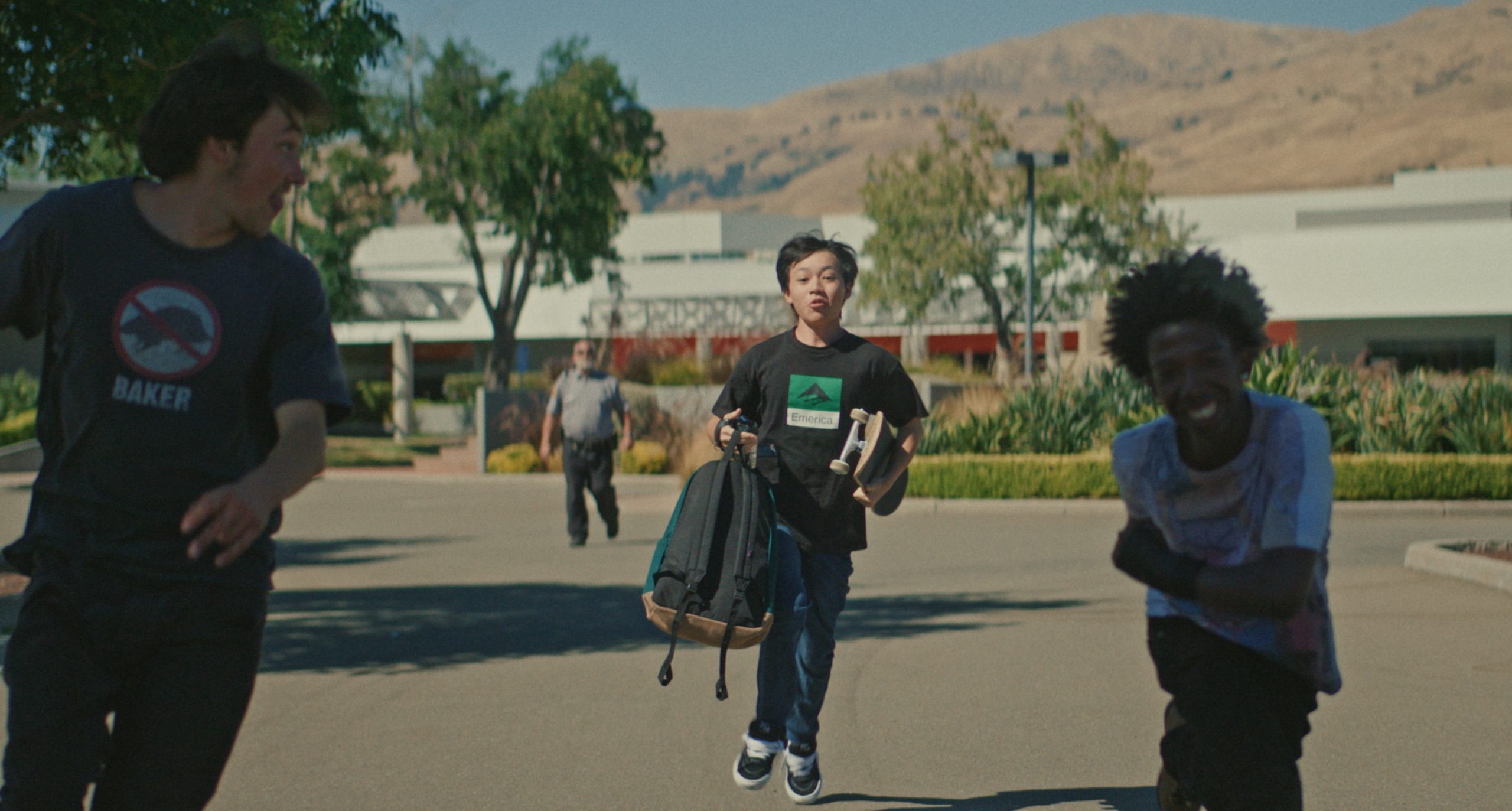There are such a bounty of moments of breathtaking specificity and quiet poignancy in Dìdi—writer-director Sean Wang’s Sundance Audience Award-winning debut feature about a Taiwanese American kid growing up in the East Bay—that it is almost heartbreaking to delectate on just a few. But by centering on the start of the film and its conclusion, you realize Wang possesses not only a preternatural feel for the emotional jumble of boyhood, but also an astute understanding of both film structure and how to mine many layers of unforced truth from his troupe of talented actors. (The film also took home a Sundance Special Jury Award for Best Ensemble Cast.)
|
DÌDI ★★★★ (4/4 stars) |
Kicking off with a bang, the film opens with Izaac Wang’s Chris—known to his junior high friends as Wang Wang and to his family as Dìdi (Mandarin for “younger brother”)—fleeing with ferocious glee from an exploding suburban mailbox that he has just filled with fireworks. Captured on a handheld video camera Chris has yet to make much sense of even under more controlled circumstances, we freeze on one of the few clear images in a jumble of blur: Chris’ deviously overjoyed face, braces gleaming like a Rolls-Royce grille.
Whether intended or not, the frozen image, heavily featured in the film’s marketing, is an exquisite reworking of the most iconic freeze frame in cinema: the final shot of a defeated Antoine Doinel in another impressive first film, Francois Truffaut’s The 400 Blows. But where that shot symbolized childhood’s final extinguishing, this image captures youth in its full incandescence and fury, blazing with chaos, possibility, and a wonder so vast that it feels a bit like terror.

Being that Dìdi takes place in August of 2008, Chris’ fumbling self-expression and discovery takes place less on the streets than in the yet uncharted territory of social media, which at that very moment was switching away from the loosey-goosey Myspace to the more grown-up Facebook.
Here is where Chris flirts for the first time, agonizing over which emojis should cap off the text messages he sends his crush (Mahaela Park); where he silently grieves when he loses top four status with his best friend (Raul Dial); and where, in what is one of the most tender and excruciatingly prescient scenes of any film so far this year, confesses the agony and sadness he feels over the rapidly imploding state of his life to a sympathetic chatbot.
Meanwhile, he is at war with his sister Vivian (a wonderful Shirley Chen), who is about to leave home and begin a new life as an incoming freshman at far-off UC San Diego. When not dismissing his mother Chungsing (Joan Chen), he cruelly torments her, rolling his eyes at her “Asian-ness” when she disassembles her Big Mac and eats it with a knife and fork or when she uses an umbrella to keep off the sun.
The only household member with whom he peacefully coexists—mainly because she holds as much contempt for Chungsing as he does—is his beloved Nai Nai, played by Sean Wang’s real-life grandmother Chang Li Hua. (The film was shot—with exquisite clarity—in his childhood home in Fremont, California.)

As for the ending, I won’t give much away, but it takes place around the Wangs’ kitchen table, and centers on the remarkable faces of the film’s two featured actors, Izaac Wang and Joan Chen.
Izaac Wang—at 16 already an industry veteran having starred in 2019’s Good Boys, 2021’s Clifford the Big Red Dog, and provided a featured voice for Disney’s Raya and the Last Dragon—is revelatory. Swinging from bravado to vulnerability to comic desperation (such as when Chris attempts to impress his new skater friends by “Wu-Tanging” a joint at a party), he delivers a juvenile performance on par with Henry Thomas in E.T.
But the secret to the film’s poignancy and lasting power is the way Sean Wang conceives the character of Chungsing—an artist whose talent for and dedication to painting goes largely unnoticed both inside her house and in the contests she enters—and the manner in which the luminous Joan Chen plays her. The Last Emperor star cycles through regret, nervousness, resentment and an intense love for children whose lives she barely understands, all with such deftness that you don’t realize until it’s over that the film is as much about Chungsing’s potential artistic flowering as it is about Chris’.
It’s an impressive switcheroo befitting a film which, along with displaying a knack for the evocative detail, overflows with the kind of empathy that too often goes missing when filmmakers evoke their own origin stories. Sometimes the key to being a great artist is as simple as recognizing that you may not be the only one in the room.

